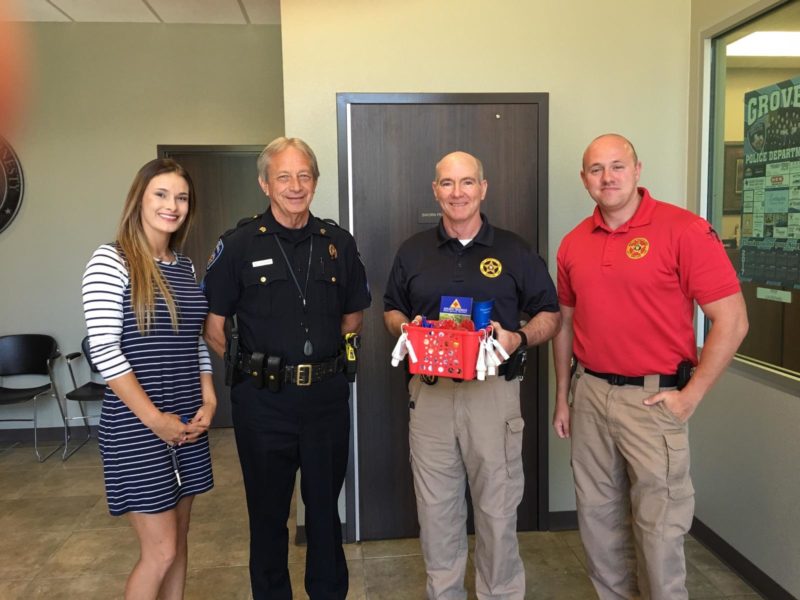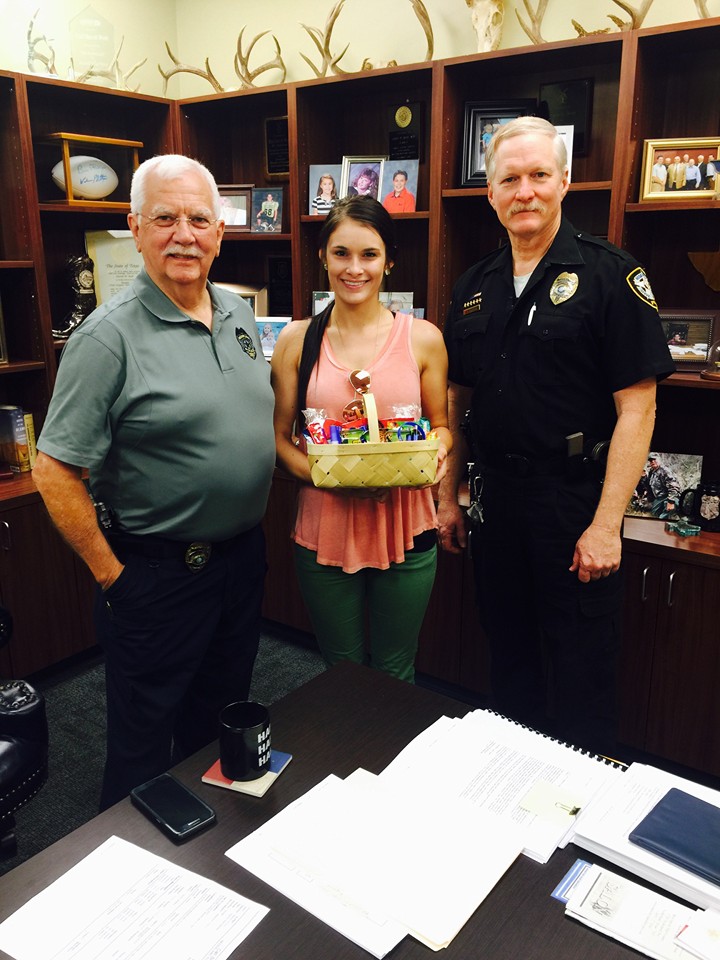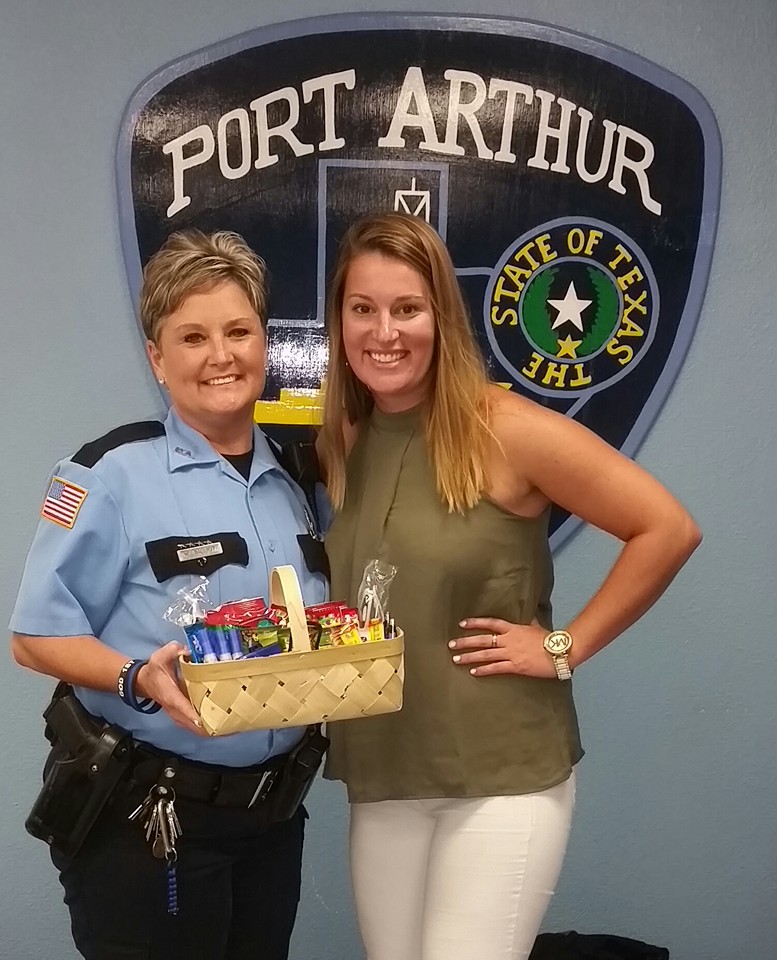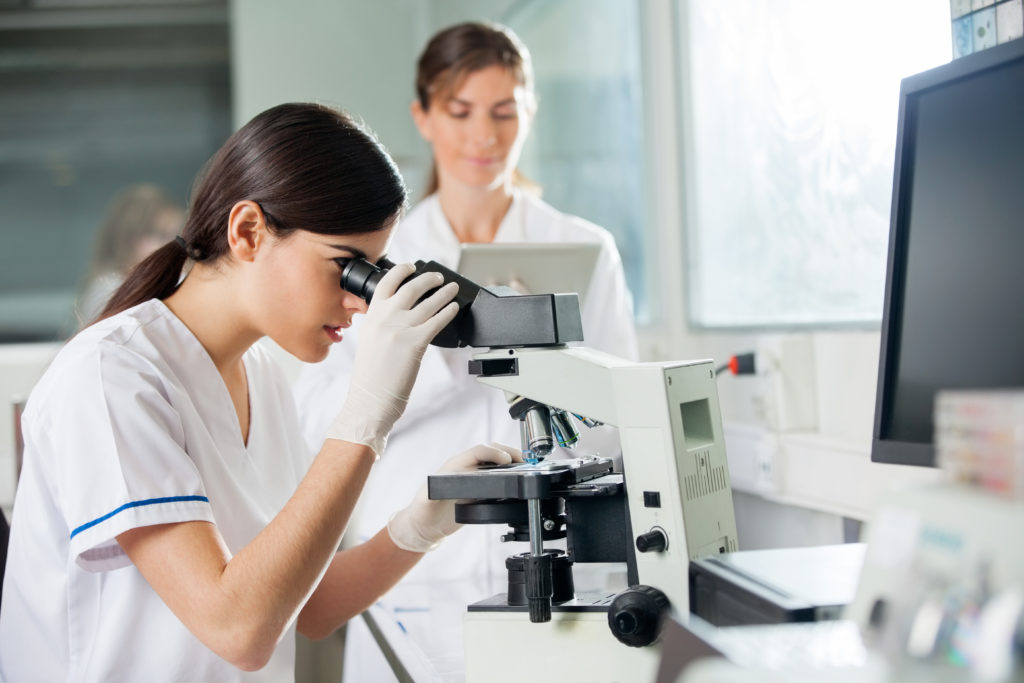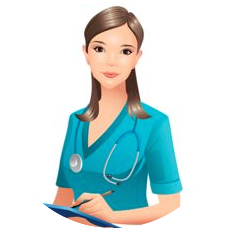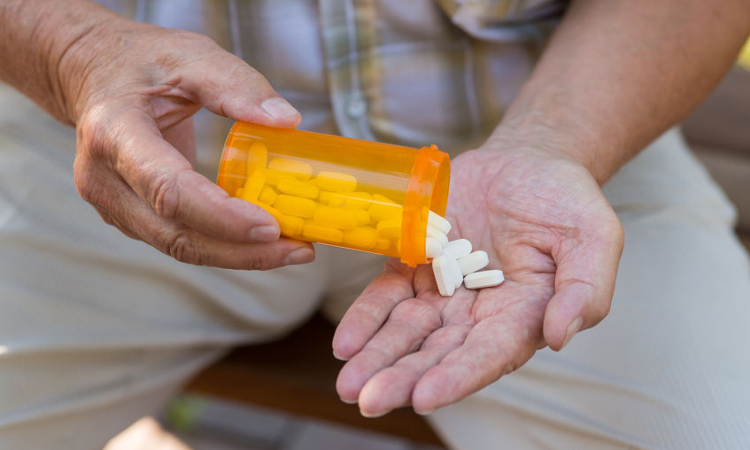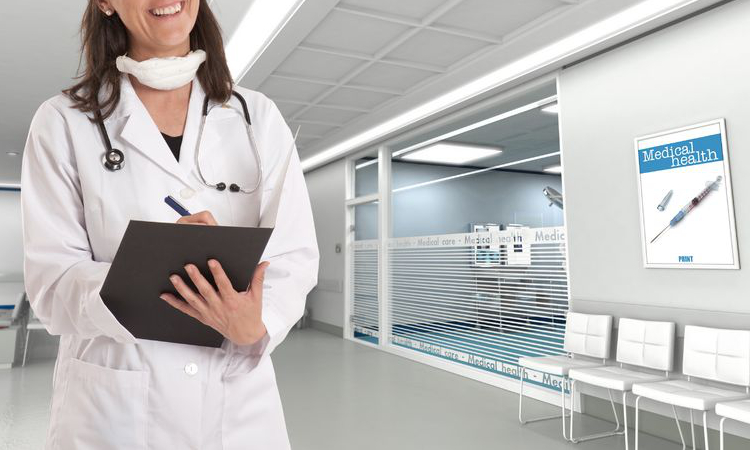Resources
GTEC Celebrates Our Brave Men and Women in Blue
Golden Triangle Emergency Center performs emergency services for our patients everyday, but it’s not just our team that keeps our community safe.
For National Police Appreciation Week, we visited local law enforcement to show our gratitude for their life-saving services. Keep reading to see how our day went!
Our team spoke with Nederland Police Chief, Darrell Bush, about police week and how they contribute to our communities.
Q: Are you doing anything to celebrate police week?
A: Just doing our jobs.
Q: What does this week mean to you and does it mean more now to you with everything going on in the media?
A: It’s a difficult time to be a cop. On the opposite side of that there has been a positive response from the community and a great show of support. Our community is great, the individuals and businesses, and we appreciate all they do for us and support they give to us.
“We’re grateful for the service and bravery of our law enforcement,” said Kari Busch, Marketing Director at GTEC. “We support all police departments. Police men and women are always welcome to come into our facility for refreshments and we were honored to be able to bring them a basket of goodies we know they enjoy.”
“It is great that the American public takes a week to recognize these brave men and women,” said Nederland Police Chief Darrell Bush.
GTEC provides our communities with the no-wait emergency care they deserve in state-of-the-art facilities 24 hours a day, 365 days a year. To learn more about our services, including CT Scanner, ultrasound and X-Ray, visit this page.
How did you show your appreciation to our police force?
Nutex Health, Inc supports you and your family’s health. You can depend on Golden Triangle Emergency Center or any one of our concierge-level, freestanding emergency facilities to deliver the emergency care you deserve, 24 hours a day, 365 days a year.
Learn How the Lab at GTEC Impacts Your Emergency Care Experience
Golden Triangle Emergency Center is proud to provide our community with an unparalleled emergency care experience, but it’s not just physicians and nurses who make this possible. Our team of highly-trained and dedicated lab professionals are a crucial part in ensuring patients are diagnosed and treated quickly and accurately.
During this Medical Lab Professionals Week, we’re going to hear from one of our very own lab technicians, Annie Kovatch, RN, on how they affect the emergency care experience. Keep reading to learn more.
Q: How does the lab impact the patient’s emergency care experience?
A: I am able to facilitate their care and help the physician decide, alongside the patient, what is the best treatment plan. At Golden Triangle Emergency Center, our lab is vital in ensuring patients are diagnosed and treated quickly. This means they can be sent home and on their way to feeling better faster than at a traditional emergency room.
Q: What made you want to be a lab professional?
A: I was interested by the correlation between sickness and the way the body handles it on its own. I enjoy getting to look deeper into what is making the person sick and how I can help make them better.
Q: What’s a typical day in the lab look like for you?
A: We usually see a significant amount of patients coming to us in hopes of a diagnosis due to their primary care physician being unable to resolve their problems, or a patient is unable to find someone to help them. Occasionally, we get patients with serious, even life-threatening ailments that need immediate medical attention. We’re also able to take care of occupational health and work accidents, which is very rewarding and interesting.
Q: What’s it like working at a freestanding emergency room, like Golden Triangle Emergency Center?
A: I love working at Golden Triangle Emergency Center. The comradery and the ability to bond and develop relationships with our patients is my favorite part. Before, while at a large trauma center, we were all so busy we didn’t have time to spend with the patient and learn about their medical history. Having the opportunity to spend time getting to know our patients is a great advantage to working at a freestanding emergency center.
Golden Triangle Emergency Center provides no-wait, personable and accessible emergency care in an upscale, concierge-level facility 24 hours a day, 365 days a year. Our team uses the most advanced technology available, including X-Ray, Ultrasound and CT Scanner, to diagnose and treat our patients as effectively as possible.
Want to learn more about our services? Visit this page to see a complete list of our emergency care capabilities.
Nutex Health, Inc supports you and your family’s health. You can depend on Golden Triangle Emergency Center or any one of our concierge-level, freestanding emergency facilities to deliver the emergency care you deserve, 24 hours a day, 365 days a year.
Good Nutrition vs Dieting
Doctors agree that eating a healthy diet that emphasizes good nutrition is one of the most important things people can do for their health. However, far too often dieting, especially fad dieting is associated with healthy eating and in reality this is often very far from the truth. Let’s take a closer look at good nutrition versus dieting and how to make healthy food choices.
What Is Dieting?
Dieting emphasizes calorie restriction with the goal of losing weight, especially losing weight fast. While dieting could in theory consist of a balanced approach to food and nutrients that only limits calories, far more often diets disregard the fundamentals of good nutrition and only focus on weight loss. This is particularly true of fad diets that may seek to completely remove one entire type of food (for example no protein, no carbs, or no fat), or diets that get even more restrictive and only allow one or a few different types of food.
There are several problems with these diets. First, while people may lose weight on them, especially at first, the weight loss is often unsustainable because the diet itself is unsustainable. In fact many people not only put the weight back on once going off the diet but often gain back more than they lost. Second, losing weight too quickly could present its own health challenges. The CDC recommends losing about 1-2 pounds per week. There are a host of potential dangers with losing weight too quickly including the following:
- Malnutrition
- Dehydration
- Fatigue
- Headaches
- Irritability
- Dizziness
- Constipation
- Gallstones and gallbladder problems
- Muscle loss
- Hair loss
- An imbalances of electrolytes
- Irregular menstruation
Malnutrition, especially chronic malnutrition can do serious, long-lasting damage to your body and in extreme cases even be life-threatening. Fad diets also commonly cause low energy and may make you more susceptible to infectious diseases or cause a worsening of chronic health conditions due to the stress they put on the body.
What Is Good Nutrition?
By contrast good nutrition emphasizes a diet that provides a complete source of all the vitamins, minerals, nutrients, and calories the body needs for healthy functioning. Healthy diets generally include an abundance of fruits and vegetables, lean proteins, low (but not no) fat and healthy oils, and grains. Good nutrition will not generally ‘blacklist’ any food items, but will focus on portion sizes and keeping the consumption of less nutritious or highly processed foods to a minimum.
Good nutrition absolutely makes weight loss possible and encourages the type of safe, gradual, sustainable weight loss that medical professionals recommend. Good nutrition is also crucial for managing health concerns, maintaining a strong immune system, and promoting good energy levels and a sense of well-being.
Golden Triangle Emergency Center’s goal is always to provide the resources, including health information our community needs to stay safe and healthy. However, when sickness or injuries do strike, Golden Triangle Emergency Center is there 24/7, 365 days a year with gold standard in emergency and industrial care.
Nutex Health, Inc supports you and your family’s health. You can depend on Golden Triangle Emergency Center or any one of our concierge-level, freestanding emergency facilities to deliver the emergency care you deserve, 24 hours a day, 365 days a year.
10 Easy Tips for Better Nutrition
March is National Nutrition Month and so in recognition of that GTEC has put together the following list of 10 easy tips for better nutrition. If you’re like many people you may be so overwhelmed at the prospect of a major lifestyle and diet change that you do nothing at all. Alternatively, you may have started off your new healthy diet strong only to get discouraged, feel deprived, and give up. Yet don’t despair, these tips are easy to follow and stick to long-term.
Plan in Advance
As with most things, the key to a successful diet is, in large part, planning. Many people are well aware that they shouldn’t do their grocery shopping while hungry, but that also applies to deciding what you’re going to eat. Good nutrition and a healthy diet can easily go right out the window if you’re already ravenously hungry and forced to make a quick decision about what to eat.
Instead, plan your meals ahead of time and make sure you have all your ingredients on hand and your kitchen ready to go. Being out of something or having a sink full of dirty dishes can make even the most health conscious person tempted to make some quick, unhealthy substitutions, so be ready and plan ahead! If you don’t feel like you have time to cook, you may also consider making your food for the week all at one time and freezing or refrigerating suitable portion sizes separately.
Recreate Favorites at Home
We all have our special favorite dishes at restaurants, but unfortunately those old standbys are often full of empty calories. Do your waistline a favor and consider recreating these favorite meals at home instead. Try Googling your favorite recipes and see if you can make it, don’t be afraid to make healthy substitutions when necessary. You can also turn this into a regular family event or a fun addition to date night!
Skip the Salt
Many people reach for the salt shaker before they even taste their food. Unfortunately too much salt can have negative health consequences and lead to uncomfortable bloating. Instead, commit to trying at least a few bites of your food before you add that salt. If you do find that your meal is lacking something, consider other flavorful additions like herbs and spices. If you’re a diehard salt addict, try gradually decreasing the amount you use until you can get it down to a more moderate level without feeling deprived.
Add Vegetables as Your Side
French fries, mashed potatoes, chips, rice, and pasta are all popular side dishes or bases to meals; however, these tasty favorites can quickly tack on extra calories without offering much nutritional value. Meanwhile, Americans are chronically consuming less vegetables than they should be. Tackle both these problems by simply substituting a vegetable dish in place of the chips or pasta.
Don’t think you’re a vegetable person? Don’t be so sure. The type of vegetables you select and the preparation style can make a big difference. Just because you didn’t like steamed broccoli as a kid doesn’t mean you won’t enjoy a vegetable medley as an adult.
Have Dessert but Make It Fruit
Vegetables aren’t the only healthy foods many people get too few of. just about everyone loves desserts of some kind and many people freely admit to having a big sweet tooth yet, for many people fresh fruit is not part of their diet. Next time instead of reaching for the ice cream or cake, consider having a bowl of fresh fruit. Want a quick, convenient snack on the go that satisfies your craving for sweets? Grab an apple or a banana.
Replace Sugary Drinks with Water
Proper hydration is not only important for good health, it is also important for people who are dieting because it prevents hunger and thirst triggers from getting mixed up and helps you feel fuller, longer. Try taking advantage of these benefits by replacing some of those sugar-laden soft drinks with a fresh glass of H2O. Find regular water too bland and boring? Punch it up with a slice of lemon, orange, cucumber or other preferred fruit.
Slow Down While Eating
The reality is that people’s mouths literally work faster than their stomachs. Research shows that it takes about twenty minutes from the time food is first eaten until the brain registers a satisfied, full feeling. That means that if you’re scarfing down your food too fast it’s easy to overeat because you’re not giving your stomach and brain time to catch up. Instead, make eating a more leisurely activity. Chew your food thoroughly and savor each bite. Stop between each mouthful and chat with your dining companions or take a sip of water. Consciously ask yourself whether or not you’re full before you mindlessly clean your plate.
Limit Portions Not Foods
Unless you have food allergies or have been advised by your doctor to avoid certain foods altogether, consider focusing more on limiting portions sizes than eliminating particular foods from your diet altogether. Sacrificing a favorite treat is tough and it may be especially discouraging if you feel like it’s permanently on the banned list. Instead, let yourself have occasional treats but limit portion sizes and don’t over indulge.
Speaking of portion sizes, consider shrinking them for all the foods you eat, not just the unhealthy ones. Restaurant and fast food portion sizes along with long-held beliefs about how much it takes to fill you up, can skew your perception about what a proper portion size is. Instead, consider taking a small helping than normal and seeing if you’re still hungry when you finish that. You can always go back for seconds if necessary, but for many people, once the food is on their plate they’re going to eat it.
Add Smart Snacks
Going too long without a meal and getting too hungry can also derail your efforts to eat right by making you overcompensate for your hunger with bad choices or excessive portion sizes. Instead add some smart snacks into the rotation between meals and try to shrink your portions to compensate. Try having a handful of nuts or a piece of fruit to tide you over. Just avoid reaching for the candy bars or chips.
Get Enough Rest
The last tip on this list may seem unrelated to nutrition, but in fact studies show that when people are sleep deprived they often overeat and make worse nutritional choices as a means of getting that quick sugar rush or making themselves feel better. Don’t fall into this trap. Instead aim to get at least 7-9 hours of sleep every night.
Golden Triangle Emergency Center’s goal is always to provide the resources, including health information our community needs to stay safe and healthy. However, when sickness or injuries do strike, Golden Triangle Emergency Center is there 24/7, 365 days a year with gold standard in emergency and industrial care.
Nutex Health, Inc supports you and your family’s health. You can depend on Golden Triangle Emergency Center or any one of our concierge-level, freestanding emergency facilities to deliver the emergency care you deserve, 24 hours a day, 365 days a year.
A Child Safe Car Could Save Lives
By Jenny Holt
Every year, over 120,000 children under the age of 13 are injured as a result of a car accident. 600 more children do not survive the accidents. Whether they were inside the car or nearby when the accident happened, there is a lot drivers and parents can do to ensure their car is child safe. These changes range from habits and safe driving to more technical changes.
We parents and drivers have a responsibility to ensure our cars are well maintained, that we only drive when able to do so and when safe to do so, and to make sure items such as child car seats and booster seats are well installed. For example, these are 6 common mistakes parents make:
- 1. Using the wrong kind of car seat
- 2. Not registering the seat with the manufacturer
- 3. Not securing the seat adequately to the vehicle
- 4. Not securing the child to the seat properly
- 5. Not using booster seats for older children
- 6. Ignoring car seat recalls
However, there are more fundamental changes we can make. Of those killed each year, 35% of them were not wearing a seatbelt at the time of the accident. To learn more, check out this expert guide on how to make your car child safe.
Golden Triangle Emergency Center’s goal is always to provide the resources, including health information our community needs to stay safe and healthy. However, when sickness or injuries do strike, Golden Triangle Emergency Center is there 24/7, 365 days a year with gold standard in emergency and industrial care.
Nutex Health, Inc supports you and your family’s health. You can depend on Golden Triangle Emergency Center or any one of our concierge-level, freestanding emergency facilities to deliver the emergency care you deserve, 24 hours a day, 365 days a year.
February Is Heart Health Month
Humans are living longer than ever, yet despite this growing positive trend, every year thousands of people worldwide die from heart disease. In fact, heart disease is the leading cause of death for both men and women in the United States. The good news, however, is that heart disease is considered a preventable condition. February is heart health month so GTEC wants to take this opportunity to educate our readers and patients about heart disease and what they can do to reduce their risks.
What Is Heart Disease?
Heart disease is a broad term that encompasses a wide variety of diseases and defects of the cardiovascular system including arteries, veins, blood vessels, and the heart itself. Typically when people refer to heart disease, cardiovascular disease, or coronary artery disease, they are referring to a buildup of plaque in the heart’s arteries. This buildup is atherosclerosis.
This plaque buildup is very dangerous because it can result in a heart attack or stroke. A blockage of blood flow to the extremities can also result in pain, infections, numbness, or even gangrene. When plaque builds up, they can cause blood clots in the affected area or may travel to different parts of the body, causing blockages there. If the clot goes to the brain it can cause a stroke.
Know the Symptoms and Don’t Wait
Chest pain and shortness of breath are two of the most common symptoms of heart disease and often proceed a heart attacks. Other symptoms can be nausea, indigestion, heartburn, abdominal pain, pressure, tightness, pain, or squeezing in the chest or arms and may spread to your neck, jaw, or back. The acronym FAST is used to help detect a stroke victim. The acronym stands for Facial drooping, Arm weakness, Speech difficulties and Time.
When it comes to heart attacks and strokes time is of the essence. Do not wait to see if your condition improves if you feel like you may be having a heart attack or stroke seek immediate emergency medical care and do not try to drive yourself to the ER. You could potentially lose consciousness while behind the wheel and cause an accident.
Reduce Your Risk of Heart Disease with Exercise
To maintain optimal heart health, the Heart Foundation, recommends engaging in aerobic exercise on a regular basis, either thirty minutes, five days a week at a moderate level, or twenty minutes, three days a week at a vigorous level. Remember that everyone has a different fitness level and what is moderate or vigorous to one person may be too intensive or not intensive enough for someone else. If you’re concerned about your general health or heart, be sure to discuss exercise plans with your doctor before beginning.
Reduce Your Risk of Heart Disease with Diet and Lifestyle Choices
The Heart Foundation recommends a diet that is low in salt, trans fats, and saturated fats, but high in unsaturated fats. Trans fats and Saturated fats are fatty or deep fried foods unsaturated fats are those found in avocado and fish. They also recommend limiting alcohol consumption, not smoking, and avoiding recreational drug use.
Maintaining a healthy weight and keeping cholesterol levels in check are extremely important. You actually have two types of cholesterol: low-density lipoprotein (LDL) the ‘bad’ type and high-density lipoprotein (HDL) the ‘good’ type. Foods high in LDL’s are milk, butter, cheese, mayonnaise, and sour cream. Foods that are high in HDL’s are soy foods, leafy green vegetables, walnut, flaxseed, and fish.
Golden Triangle Emergency Center’s goal is always to provide the resources, including health information our community needs to stay safe and healthy. However, when sickness or injuries do strike, Golden Triangle Emergency Center is there 24/7, 365 days a year with gold standard in emergency and industrial care.
Nutex Health, Inc supports you and your family’s health. You can depend on Golden Triangle Emergency Center or any one of our concierge-level, freestanding emergency facilities to deliver the emergency care you deserve, 24 hours a day, 365 days a year.
The Importance of Finishing Your Antibiotics
Thanks to antibiotics, many infections and diseases that were once debilitating or even life threatening can now be cured with a simple course of pills. However, all too often, once people begin to feel better, they may quit taking their antibiotics. Unfortunately, this can lead to serious problems that put you and others at risk.
Why People May Stop Taking Their Antibiotics Early
While the patient is sick and experiencing the worst symptoms of their infection, there is a strong incentive for them to continue taking their antibiotics: they want to feel better. Unfortunately, this motive evaporates once the patient begins to get well and if there is still medication left many quit taking it. This could happen for numerous reasons including the following common scenarios:
- The patient simply forgets to keep taking their antibiotics because they don’t feel sick and their illness is no longer on their minds.
- The patient hopes to keep the remaining antibiotics for later in case they get sick again or in case a family member gets sick.
- The patient is experiencing side effects or concerned about developing side effects and wants to stop treatment as soon as possible.
- The patient believes stopping treatment early is the best decision for their health.
The Risks of Stopping Antibiotic Treatment Early
There are major risks associated with stopping antibiotic treatment early:
Relapse – The antibiotics may have killed enough of the bacterial infection that the patient feels better, but that doesn’t mean the patient is completely well. Remaining bacteria could multiply and cause the patient to relapse if antibiotic treatment is stopped early.
Antibiotic Resistance – Perhaps the most frightening consequence of stopping antibiotic treatment early is antibiotic resistance. This occurs when some of the bacteria survive treatment and then replicate, spreading their resistant genes to a new generation of the bacteria where they can then further strengthen and spread. Since bacteria reproduces so quickly diseases are able to develop drug resistant strains very quickly. However, by taking antibiotics as recommended and finishing your prescription, it is less likely that bacteria will survive long enough to become resistant to the medication.
Thus by finishing your antibiotics you can protect yourself from relapse and others from infection by a more serious, potentially deadly antibiotic resistant strain of the disease. Always talk to your doctor before taking, or stopping taking, a prescription medication. Don’t take other people’s medications and don’t self-medicate with antibiotics or other drugs if your illness has not been diagnosed by a doctor. By following these simple practices you can help reduce your risk of serious, prolonged infections and help combat the rise of antibiotic resistant strains of diseases.
Golden Triangle Emergency Center’s goal is always to provide the resources, including health information our community needs to stay safe and healthy. However, when sickness or injuries do strike, Golden Triangle Emergency Center is there 24/7, 365 days a year with gold standard in emergency and industrial care.
Nutex Health, Inc supports you and your family’s health. You can depend on Golden Triangle Emergency Center or any one of our concierge-level, freestanding emergency facilities to deliver the emergency care you deserve, 24 hours a day, 365 days a year.
Common Misconceptions about Freestanding Emergency Rooms
Freestanding emergency rooms play an important role in the healthcare system and help millions of Americans get the care they need, quickly. However, they aren’t identical to traditional hospital-based emergency rooms and some patients may have some misconceptions about the way they work. Unfortunately these misconceptions can interfere with patients getting the quality care that they need or may simply set the patient up for frustration. GTEC will be hosting an open-house event on Monday, January 9th from 8:00am to 8:00pm at their Orange facility in which we will be addressing some common misconceptions about freestanding emergency rooms. In the meantime, in this article let’s take a look at three of the most pervasive ones.
Misconception: Patients Are Treated on a First-Come, First-Serve Basis
This misconception isn’t specific to freestanding emergency rooms, but rather tends to apply to traditional ERs as well. People often wrongly assume that emergency room treatment will be performed much like the other services they are familiar with: on a first-come, first serve basis in which the person who arrives first is treated first. However, that is not the case with freestanding or traditional emergency rooms. Instead, ERs use what is known as the triage system.
The triage system involves evaluating the patient’s injury or illness to determine how severe it is and how urgently that patient needs care. Thus, someone who comes in complaining about symptoms that could indicate a heart attack is likely to be treated by someone who is waiting to be treated for nausea or headache. Likewise a gunshot victim will likely be seen ahead of a patient with a sprained leg. This is regardless of what order the patients entered the facility in.
The triage system can be frustrating for patients who have been waiting a long time for treatment for a relatively less serious injury or illness, but it is an extremely valuable tool that saves countless lives. Fortunately, patients at freestanding emergency rooms like GTEC will benefit from much shorter wait times and a more comfortable environment than at traditional ERs.
Misconception: Patients Can Use Medicare or Medicaid to Pay for Treatment
Patients of freestanding emergency rooms often assume that they can use Medicare or Medicaid to pay for the treatment, just like they would be able to at a traditional hospital-based ER. However, unfortunately this is not correct. Under federal law freestanding emergency rooms are not able to accept Medicare or Medicaid because they are not a part of a hospital system. For more information about this topic please see our article on Why Freestanding Emergency Rooms Cannot Accept Medicare and Medicaid.
However, rest assured that freestanding emergency rooms like GTEC make it as convenient as possible to pay for treatment. We accept all private health insurance plans as well as Tricare. We also have payment plans available and convenient bill pay options like online payments and the ability to accept credit and debit cards.
If you are having a medical emergency you can still come to Golden Triangle Emergency Center no matter what insurance you have.
Misconception: If I Need to be Transferred to a Hospital I’ll Have to Wait Again
Some emergency room trips may result in the patient requiring admission into the hospital. This may occur because the patient needs surgery and extensive treatment or simply an extended stay for observation. Many patients assume that since freestanding emergency rooms aren’t connected to a hospital, if they require hospitalization they will be have to wait a second time in the hospital’s ER to be admitted.
Fortunately this is not the case. Freestanding emergency rooms have the ability to observe patients for up to 23 hours and 59 minutes before having to transfer them to a hospital. Freestanding emergency rooms are often able to get patients admitted directly to the hospital quickly and conveniently, without the need to wait a second time.
Golden Triangle Emergency Center to Host an Open-House
Golden Triangle Emergency Center is committed to providing outstanding care and to informing area residents about their medical options. To better serve the community we will be hosting an open-house event on Monday, January 9th between the hours of 8:00am and 8:00pm at the Orange facility at which time we will address additional misconceptions about freestanding emergency rooms and also provide tours of our facilities. Visitors can also look forward to gifts and prizes. Please come out and visit us! We are located at 3107 Edgar Brown Dr Orange Texas 77630.
Golden Triangle Emergency Center’s goal is always to provide the resources, including health information our community needs to stay safe and healthy. However, when sickness or injuries do strike, Golden Triangle Emergency Center is there 24/7, 365 days a year with our gold standard in emergency and industrial care.
Nutex Health, Inc supports you and your family’s health. You can depend on Golden Triangle Emergency Center or any one of our concierge-level, freestanding emergency facilities to deliver the emergency care you deserve, 24 hours a day, 365 days a year.
How to Act Quickly in a Diabetic Emergency
Over 29 million people have diabetes in the U.S., nearly 10% of the total population.
With numbers that staggering, it makes diabetes one of the most common diseases, and chances are that you know someone who’s been affected by diabetes.
During this National Diabetes Awareness Month, we want our community to be ready for any emergency they may encounter. The best way to prepare for a diabetic emergency, also called diabetic shock, is to research the symptoms of these attacks and learn how to react quickly and effectively. Keep reading to learn more.
What is a diabetic emergency?
A diabetic emergency, or diabetic shock, can occur when there is either too much sugar in the blood (hyperglycemia) or too little sugar in the blood (hypoglycemia). Often, diabetic individuals will feel dizzy and their skin may appear grey or pale during an attack. The key to stopping a diabetic emergency before it progresses is to recognize the symptoms. Look for these signs.
- Dry skin that may be warm to the touch
- Drowsiness
- Dazed or glossed-over look
- Dizziness and headaches
- Rapid pulse and labored breathing
- Sickly sweet breath
- Excessive thirst
If the person isn’t taken immediately to an emergency room, they may faint, have a seizure or even fall into a coma. Knowing that someone has diabetes certainly makes it easier to recognize these symptoms and act quickly. If you see someone in public, like at a restaurant or gym, exhibiting some of these signs, check their person for any medical identifying tags. These are often worn as bracelets or necklaces and will provide contact information in the case of a diabetic emergency. This is the quickest way to ensure they’re treated properly.
Act quickly
Once you’ve identified the symptoms, the next step is to determine if their blood sugar is too low or too high. Don’t ever assume that a diabetic individual experiencing an attack has low blood sugar as opposed to high blood sugar. If the individual is conscious, ask them what they’ve eaten that day. This will ensure that you’re helping to balance their blood sugar levels, not lower or increase them even more dangerously.
If their levels are too low, give them a sugary food or drink they can quickly eat, like:
- Sodas
- Fruit juices
- Candy
- Applesauce
Check for glucose gel packs on their person, too. If their levels are too high, give them lots of fluids. This will help to replace the nutrients lost through urination and dilute sugar in the blood. If available, give them electrolytes packs to help their tissues begin to function normally again.

If the individual is unconscious, try some of these tips while you wait on emergency first responders.
If they’re unconscious, become unconscious or their vitals don’t improve, call 911 immediately. Continue to monitor their vitals until medical emergency teams arrive.
We’re encouraging members of our community to learn more about this disease during this National Diabetes Awareness Month. For information about diabetic emergencies, visit this page.
Let us know if you’ve ever been in a situation where you had to act quickly and how you handled it!
Nutex Health, Inc. supports you and your family’s health. Come visit Golden Triangle Emergency Center or any one of our concierge-level freestanding facilities for the emergency care you deserve, 24 hours a day, 365 days a year.

